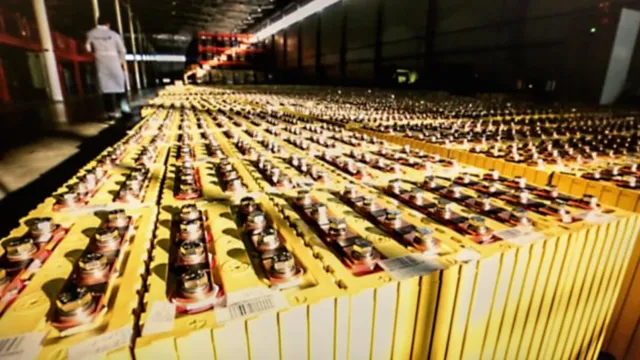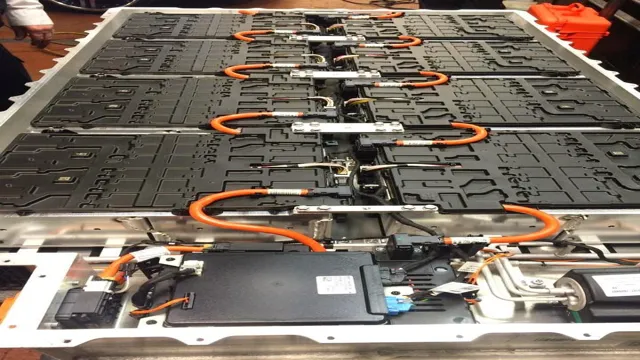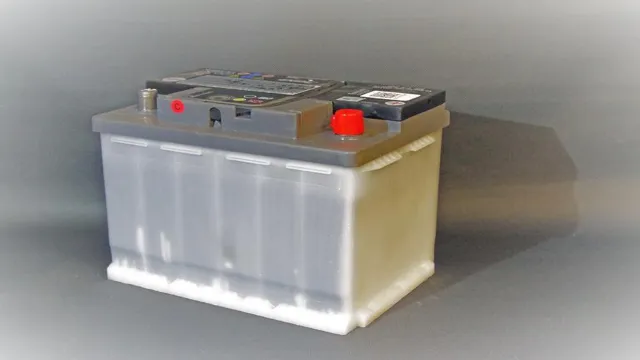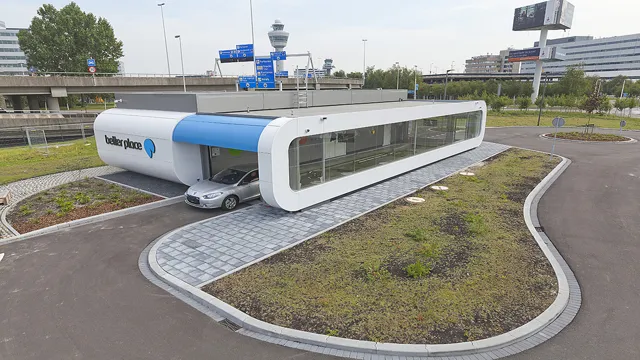Uncovering the Truth: Debunking the Myth of Electric Car Battery Pollution
As electric cars rise in popularity, many wonder about the long-term impact they have on the environment. After all, while electric vehicles are touted as a greener alternative to traditional gas-guzzlers, they still require a power source to run, which can come from a variety of sources. One major component of electric vehicles that has garnered attention in recent years is their batteries.
On the one hand, electric car batteries are a focal point of innovation and advancement in the industry. They are becoming more efficient, last longer, and are easier to manufacture. However, on the flip side, the production of these batteries does produce some level of pollution.
So, what’s the real story? Do electric car batteries contribute to pollution, and if so, how much? Let’s dig into the details.
Battery Manufacturing Process
Many people wonder if electric car batteries pollute the environment. The answer is yes, but not in the way you might think. The main issue with electric car batteries is in their manufacturing process.
The process involves the extraction and refinement of minerals such as lithium, cobalt, and nickel, which can lead to land and water pollution if not properly managed. Additionally, the transportation of these materials can contribute to greenhouse gas emissions and pollution. However, once the batteries are manufactured and used in electric cars, they produce significantly less pollution compared to traditional gasoline-powered cars.
In fact, electric cars can help reduce greenhouse gas emissions and air pollution. It’s important to remember that like any form of transportation, electric cars have an environmental impact, but striving for sustainability and reducing our carbon footprint is crucial in protecting the planet for future generations.
CO2 Emissions in Battery Manufacturing
The manufacturing process of batteries is known to contribute to CO2 emissions throughout several phases. The production process involves mining and transporting raw materials needed in creating the battery components. This process alone accounts for a large portion of CO2 emissions.
The next step is the manufacturing of the batteries, which requires the use of energy-intensive procedures, such as heating, cooling, and chemical treatments. These energy-intensive procedures also contribute to CO2 emissions. Furthermore, the transportation of finished batteries to their destinations comes with emissions from transportation modes such as ships, trucks, and airplanes.
However, it is worth mentioning that efforts are being made to reduce the CO2 emissions during battery manufacturing. Some battery manufacturing companies are actively researching and implementing alternative sources of energy such as renewable energy sources in their production processes. Thus, the adoption of cleaner energy sources and sustainable processes can reduce the CO2 emissions from battery manufacturing and help achieve a lower carbon footprint.

Battery Use and Disposal
One of the biggest concerns about electric cars is whether their batteries pollute the environment. The answer is not a straightforward one, as it depends on various factors. The production of electric car batteries requires the extraction and processing of minerals such as lithium and cobalt, which can have negative environmental impacts, particularly if not done sustainably.
Additionally, the charging of electric cars depends on the source of electricity used, with fossil fuels being the dominant source in many regions. However, electric car batteries themselves do not emit any pollutants during their use, making them much cleaner than traditional gasoline vehicles. Furthermore, with proper disposal and recycling, the materials in electric car batteries can be reused, reducing the potential for pollution.
Overall, while there are environmental costs associated with electric car batteries, they are still a more environmentally friendly option than traditional gasoline vehicles.
Reduced Tailpipe Emissions
When it comes to reducing tailpipe emissions, batteries play a critical role in the transportation sector. Electric vehicles use batteries to power their motors, which means they produce no tailpipe emissions. That’s great news for the environment, as it significantly reduces the amount of harmful pollutants that are released into the air we breathe.
However, the use and disposal of batteries must also be properly managed to ensure they don’t end up having a negative impact on the environment. That’s why it’s essential to recycle batteries once they have reached the end of their life. If not, they can end up in landfills, where they can leak harmful chemicals into the soil and potentially contaminate nearby water sources.
By using and disposing of batteries responsibly, we can continue to reap the benefits of reduced tailpipe emissions without creating new environmental problems.
Battery Recycling Process
Battery recycling is an important process that helps to reduce the environmental impact of discarded batteries. Batteries are commonly used in a wide range of electronic devices, including mobile phones, laptops, and electric vehicles. While these batteries provide a convenient source of power, they also require proper disposal and recycling to prevent them from ending up in landfills and polluting the environment.
The battery recycling process involves the collection, sorting, and processing of used batteries to recover valuable materials such as lead, cobalt, and lithium. These materials can then be used to manufacture new batteries, reducing the demand for raw materials and reducing the overall environmental impact of battery production. Battery recycling plays a vital role in reducing waste and promoting sustainable practices, making it an essential part of our efforts to create a greener future.
Impact on the Environment
Battery use has become a major concern for the environment due to the significant amount of pollution caused by their disposal. Rechargeable batteries are a better alternative to regular batteries as they can be used multiple times, reducing the amount of waste produced. Proper disposal of batteries is also crucial in mitigating their environmental impact.
Many countries have implemented recycling programs for batteries where they are collected and sent to specialized facilities for safe disposal. It’s important to note that even rechargeable batteries have a limited lifespan and must be disposed of properly when they no longer hold a charge. Old batteries can also have a negative impact on the environment if they end up in landfills or incinerators, as they release toxic chemicals such as lead and cadmium.
So, let’s remember to use rechargeable batteries and dispose of them properly to minimize their impact on the environment.
Comparison to Gasoline Cars
When it comes to comparing electric cars to gasoline cars, one major consideration is the impact on the environment. While it may be true that the production and disposal of electric car batteries can lead to pollution, it’s important to consider the bigger picture. Gasoline cars emit greenhouse gases and contribute to air pollution on a daily basis, whereas electric cars produce zero emissions while driving.
Additionally, the production of gasoline itself has significant environmental impacts, from oil drilling to refinery operations. On the other hand, the production of electricity for electric vehicles can be sourced from renewable sources such as wind or solar power, minimizing their impact on the environment. While electric car batteries may not be perfect, they are a step in the right direction towards a more sustainable and eco-friendly transportation system.
So, do electric car batteries pollute? Yes, to some extent. But when compared to the alternative of gasoline cars, the benefits of electric cars far outweigh any potential drawbacks.
Lifecycle Analysis Comparison
When it comes to comparing the lifecycle analysis of electric cars and gasoline cars, the differences are striking. Electric cars have a significantly lower carbon footprint throughout their lifetime, starting from the manufacturing process up to their disposal. Unlike gasoline cars that emit pollutants continuously, electric cars produce zero emissions while being driven, making them a much cleaner option for the environment.
Additionally, the source of electricity for charging electric vehicles is also crucial to consider, as it affects their carbon footprint. If the power supply comes from renewable sources, the environmental benefits of electric cars are much higher. In contrast, gasoline cars solely rely on fossil fuels, which have a significant impact on climate change.
Therefore, the decision to opt for an electric car over a gasoline car not only saves you money on fuel costs but also contributes to a greener planet.
Greenhouse Gas Emissions Comparison
Greenhouse gas emissions from electric cars are significantly lower than those produced by gasoline cars. According to a study conducted by the Union of Concerned Scientists (UCS), on average, electric cars produce almost half the amount of greenhouse gases emitted by gasoline cars. The study found that the production of electricity used to charge electric cars results in fewer emissions than the combustion of gasoline in traditional cars.
Additionally, advancements in battery technology have increased the efficiency and range of electric cars, making them a more attractive option for those looking to reduce their carbon footprint. While electric cars may still contribute to emissions if the electricity used to charge them comes from fossil fuels, there are options for renewable sources of electricity, such as wind and solar power. Overall, the switch to electric cars can play a significant role in reducing greenhouse gas emissions and combating climate change.
Conclusion
In conclusion, the question of whether electric car batteries pollute is not a straightforward one. While the production and disposal of these batteries do have environmental impacts, the benefits they bring in terms of reduced emissions and improved air quality cannot be ignored. It’s all about striking a balance between the pros and cons, and realizing that nothing is ever completely perfect.
So, next time someone asks if electric car batteries pollute, we can say with confidence “yes, but not enough to outweigh the many benefits they provide.”
FAQs
How do electric car batteries impact the environment?
Electric car batteries produce fewer emissions during operation than traditional gasoline engines, but their manufacture and disposal can contribute to pollution if not done responsibly.
Can electric car batteries be recycled?
Yes, electric car batteries can be recycled to recover valuable metals and reduce waste. However, the recycling process can also generate pollution if it is not performed correctly.
Are electric car batteries safer for the environment than traditional car batteries?
Yes, electric car batteries are generally considered safer for the environment than traditional car batteries because they do not contain toxic materials like lead and sulfuric acid.
How can I dispose of an old electric car battery?
Old electric car batteries should be properly recycled or disposed of at a designated facility to minimize the impact on the environment. Many electric car manufacturers offer recycling programs or take-back systems for old batteries.





